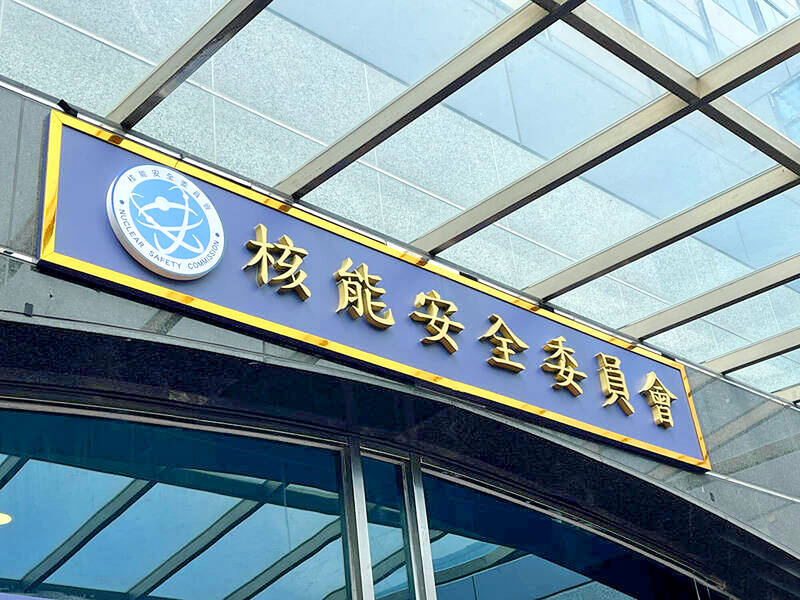The Nuclear Safety Commission (NSC) plans to launch a four-year project to develop small modular reactor (SMR) and micro modular reactor technologies, an official familiar with the matter said.
Before the four-year project, which is estimated to cost NT$800 million (US$26.45 million), the commission would spend NT$100 million next year to fund a research project on SMRs and establish the capacity to review applications for building SMRs, the official said.
The plan was unveiled after the referendum last month on whether to reactivate the Ma-anshan Nuclear Power Plant in Pingtung County failed.

Photo: Taipei Times
Although the number of votes in favor did not reach the threshold for approval, the “yes” votes outnumbered “no” votes in every locality. In Hengchun Township (恆春), where the plant is located, 60 percent of those who voted approved the proposal.
President William Lai (賴清德) also ordered Taiwan Power Co (台電) to begin safety inspections at the plant after the referendum, adding that the government does not exclude the possibility of developing new-generation nuclear energy technology.
The official said that the project, which would be executed by the National Atomic Research Institute, would focus on the research on low-carbon and high energy density SMRs.
Key tasks to be accomplished through the project include introducing technology of building SMRs domestically at the initial phase, providing the technology and legal framework for new-generation nuclear energy policy, establishing the capacity to review applications for building SMRs, forming a national team to develop SMRs and reducing the time required to build SMRs, they said.
The nation’s demand for nuclear energy specialists has decreased due to the “nuclear-free homeland” policy. As such, the institute plans to send researchers to national nuclear energy laboratories in Europe, North America and Japan to engage in short-term research or internships, or take nuclear engineering courses at prestigious universities, the official said.
Meanwhile, the institute would recruit international specialists or Taiwanese doing nuclear energy research overseas to help bring in the most advanced nuclear technology and work with local nuclear power specialists, they said.
Regarding the possibility of allowing the private sector or academic institutions to build new-generation nuclear reactors, the commission said that the US, the UK and Japan have invested in related studies, but none has achieved commercial operational capability.
In the US, regulatory standards for the new reactor types are still being drafted, it added.
“We will closely monitor international developments in regulatory frameworks,” it said.

MILITARY BOOST: The procurement was planned after Washington recommended that Taiwan increase its stock of air defense missiles, a defense official said yesterday Taiwan is planning to order an additional four PAC-3 MSE systems and up to 500 missiles in response to an increasing number of missile sites on China’s east coast, a defense official said yesterday. The official, who spoke on condition of anonymity, said that the proposed order would be placed using the defense procurement special budget, adding that about NT$1 trillion (US$32,88 billion) has been allocated for the budget. The proposed acquisition would include launchers, missiles, and a lower tier air and missile defense radar system, they said The procurement was planned after the US military recommended that Taiwan increase

POLITICAL AGENDA: Beijing’s cross-strait Mid-Autumn Festival events are part of a ‘cultural united front’ aimed at promoting unification with Taiwan, academics said Local authorities in China have been inviting Taiwanese to participate in cross-strait Mid-Autumn Festival celebrations centered around ideals of “family and nation,” a move Taiwanese academics said politicizes the holiday to promote the idea of “one family” across the Taiwan Strait. Sources said that China’s Fujian Provincial Government is organizing about 20 cross-strait-themed events in cities including Quanzhou, Nanping, Sanming and Zhangzhou. In Zhangzhou, a festival scheduled for Wednesday is to showcase Minnan-language songs and budaixi (布袋戲) glove puppetry to highlight cultural similarities between Taiwan and the region. Elsewhere, Jiangsu Province is hosting more than 10 similar celebrations in Taizhou, Changzhou, Suzhou,

TWO HEAVYWEIGHTS: Trump and Xi respect each other, are in a unique position to do something great, and they want to do that together, the US envoy to China said The administration of US President Donald Trump has told Chinese President Xi Jinping (習近平) “we don’t want any coercion, but we want [the Taiwan dispute] resolved peacefully,” US ambassador to China David Perdue said in a TV interview on Thursday. Trump “has said very clearly, we are not changing the ‘one China’ policy, we are going to adhere to the Taiwan Relations Act, the three communiques and the ‘six assurances’ that were done under [former US president Ronald] Reagan,” Perdue told Joe Kernen, cohost of CNBC’s Squawk Box. The act, the Three Joint Communiques and the “six assurances” are guidelines for Washington

DEEPENING TIES: The two are boosting cooperation in response to China’s coercive actions and have signed MOUs on search-and-rescue and anti-smuggling efforts Taiwan and Japan are moving to normalize joint coast guard training and considering the inclusion of other allies, the Japanese Yomiuri Shimbun reported yesterday. Both nations’ coast guards in June sent vessels to the seas south of the Sakishima Islands to conduct joint training, the report said, adding that it was the second joint maritime training exercise since the nations severed formal diplomatic ties in September 1972. Japan dispatched the Nagoya Coast Guard’s Mizuho, a 134m, 6,000-tonne patrol vessel which can carry a helicopter, while the Coast Guard Administration (CGA) sent the 126m, 4,000-tonne Yunlin, one of its largest vessels, the report